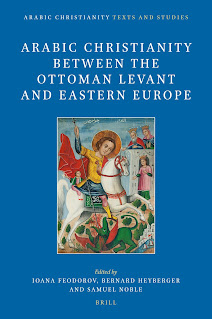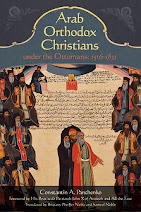Arabic original here.
The Syrian Cain and Abel
When Cain (Qabil in the Islamic tradition) killed his brother Abel, God said to him, "The voice of your brother’s blood cries out to Me from the ground. So now you are cursed from the earth, which has opened its mouth to receive your brother’s blood from your hand... A fugitive and a vagabond you shall be on the earth" (Genesis 4:10-12). It is noteworthy here that God did not say, "The voice of your brother cries out to Me," but rather "The voice of your brother's blood..." Here there is an indication of the crime that Cain committed and of the punishment that he would receive as a result of his brother's spilled blood. The reason that led Cain to kill his brother Abel is that he had made an offering to the Lord and "the Lord respected Abel and his offering, but He did not respect Cain and his offering. And Cain was very angry, and his countenance fell" (Genesis 4:4-5). So he went and killed his brother Abel. God accepted Abel's offering because he did better deeds and was more pious than his brother Cain, so God said to Cain, "Why are you angry? And why has your countenance fallen? If you do well, will you not be accepted? And if you do not do well, sin lies at the door. And its desire is for you, but you should rule over it” (Genesis 4:6-7).
The Qur'anic account of Cain's murder of his brother agrees with the account in Genesis. They both offered a sacrifice to God and " it was accepted from the one of them and it was not accepted from the other. Qabil said, 'I will surely kill you.' Abel answered, 'God only accepts from those who ward off evil'" (Surat al-Ma'ida 27). So God did not accept Qabil's offering on account of his impiety.
When Qabil decided to kill his brother, the latter did not respond to him in a way that contradicted his piety and principles: "Even if you stretch out your hand against me to kill me, I shall not stretch out my hand against you to kill you. Lo, I fear God, the Lord of the Worlds" (Surat al-Ma'ida 28). He did not return Cain's evil with evil. Abel left judgment and retribution to God, since he said to Qabil, " I would rather you should bear the punishment of the sin against me and your own sin and become one of the owners of the fire. That is the reward of evil-doers" (Surat al-Ma'ida 29). Abel preferred being killed to being his brother's murderer.
Saint Ambrose of Milan (d. 397) says, "The sinner is a slave to fear, a slave to avarice and a slave to anger. Even though a person in Cain's position might think himself to be free, he is even more enslaved than someone under the heel of tyranny." Ambrose himself observes that "Cain was afraid of being killed and he did not know where to flee. Evil grows and multiplies the more it is practiced, since it has no bounds or moderation." Thus from time immemorial, from the beginning of history to our own day man has not ceased to kill his fellow man, man has not ceased to prefer slavery to sin and evil has not ceased to invite evil... The teacher Origen sees in the blood of Abel a symbol for the blood of all the martyrs and says, "What is said of Abel, who was eliminated from existence by Cain, the unjust murderer, applies to all those whose blood has been shed unjustly. God's saying, 'The voice of your brother’s blood cries out to Me from the ground.' Also applies to all the martyrs."
In Syria today, the Syrian Cain continues to treat as fair game his brother Abel's blood, which cries out to God. Nevertheless, we have not lost hope that the spilled blood of Abel-- which in the Christian tradition symbolizes the blood of Christ-- will triumph over the sword. And it has triumphed.
The Syrian Cain and Abel
When Cain (Qabil in the Islamic tradition) killed his brother Abel, God said to him, "The voice of your brother’s blood cries out to Me from the ground. So now you are cursed from the earth, which has opened its mouth to receive your brother’s blood from your hand... A fugitive and a vagabond you shall be on the earth" (Genesis 4:10-12). It is noteworthy here that God did not say, "The voice of your brother cries out to Me," but rather "The voice of your brother's blood..." Here there is an indication of the crime that Cain committed and of the punishment that he would receive as a result of his brother's spilled blood. The reason that led Cain to kill his brother Abel is that he had made an offering to the Lord and "the Lord respected Abel and his offering, but He did not respect Cain and his offering. And Cain was very angry, and his countenance fell" (Genesis 4:4-5). So he went and killed his brother Abel. God accepted Abel's offering because he did better deeds and was more pious than his brother Cain, so God said to Cain, "Why are you angry? And why has your countenance fallen? If you do well, will you not be accepted? And if you do not do well, sin lies at the door. And its desire is for you, but you should rule over it” (Genesis 4:6-7).
The Qur'anic account of Cain's murder of his brother agrees with the account in Genesis. They both offered a sacrifice to God and " it was accepted from the one of them and it was not accepted from the other. Qabil said, 'I will surely kill you.' Abel answered, 'God only accepts from those who ward off evil'" (Surat al-Ma'ida 27). So God did not accept Qabil's offering on account of his impiety.
When Qabil decided to kill his brother, the latter did not respond to him in a way that contradicted his piety and principles: "Even if you stretch out your hand against me to kill me, I shall not stretch out my hand against you to kill you. Lo, I fear God, the Lord of the Worlds" (Surat al-Ma'ida 28). He did not return Cain's evil with evil. Abel left judgment and retribution to God, since he said to Qabil, " I would rather you should bear the punishment of the sin against me and your own sin and become one of the owners of the fire. That is the reward of evil-doers" (Surat al-Ma'ida 29). Abel preferred being killed to being his brother's murderer.
Saint Ambrose of Milan (d. 397) says, "The sinner is a slave to fear, a slave to avarice and a slave to anger. Even though a person in Cain's position might think himself to be free, he is even more enslaved than someone under the heel of tyranny." Ambrose himself observes that "Cain was afraid of being killed and he did not know where to flee. Evil grows and multiplies the more it is practiced, since it has no bounds or moderation." Thus from time immemorial, from the beginning of history to our own day man has not ceased to kill his fellow man, man has not ceased to prefer slavery to sin and evil has not ceased to invite evil... The teacher Origen sees in the blood of Abel a symbol for the blood of all the martyrs and says, "What is said of Abel, who was eliminated from existence by Cain, the unjust murderer, applies to all those whose blood has been shed unjustly. God's saying, 'The voice of your brother’s blood cries out to Me from the ground.' Also applies to all the martyrs."
In Syria today, the Syrian Cain continues to treat as fair game his brother Abel's blood, which cries out to God. Nevertheless, we have not lost hope that the spilled blood of Abel-- which in the Christian tradition symbolizes the blood of Christ-- will triumph over the sword. And it has triumphed.








No comments:
Post a Comment